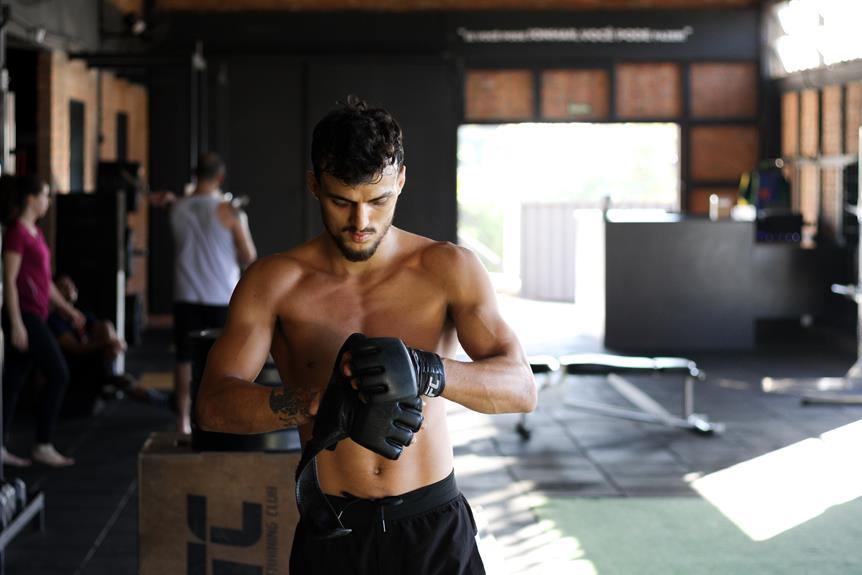UFC contracts, a crucial aspect of the MMA industry, have long been a topic of debate. Fighters are left wondering if these agreements are truly in their best interest. With restricted negotiating power, limited unionization rights, and sponsorship limitations, concerns have been raised about the fairness of these contracts.
In this article, we will delve into the inner workings of UFC contracts, exploring the various components and discussing the potential need for changes in the industry. Get ready to uncover the truth behind UFC contracts.
Key Takeaways
- UFC contracts can be restrictive and controlling towards fighters, with elements such as uniform policies, sponsorship restrictions, and participation in anti-doping programs.
- Fighters lack the right to form a union, have limited negotiating power, and may not receive compensation for injuries or unemployment benefits.
- UFC contracts can be extended if a fighter declines a fight or is unable to compete due to various reasons, and UFC can cut a fighter whenever they please.
- UFC has the right to terminate and release fighters from their contracts for various reasons, and the contracts are exclusive, preventing fighters from competing with other promotions.
Overview of UFC Contracts
UFC contracts outline the terms and conditions of agreements between the UFC and fighters regarding pay, number of fights, and duration. These contracts can vary in length, typically spanning three fights, but they can extend up to eight fights or be based on a specific duration.
It's important to note that fighters must be offered a minimum of three fights per year, but they've the choice to accept or decline. Fighter pay is usually divided into show money and win money, with additional bonuses for exceptional performance.
When compared to other combat sports, UFC contracts have been the subject of debate regarding their fairness. Some elements of these contracts have raised concerns about being restrictive and controlling towards fighters. However, the UFC enforces uniform policies, restricts sponsorship opportunities, and requires participation in anti-doping programs, distinguishing it from other combat sports organizations.
Contract Length and Fighter Obligations
Fighters are obligated to fulfill certain requirements and adhere to specific terms outlined in their UFC contracts. These obligations include participating in a specified number of fights and abiding by the UFC Fighter Conduct Policy. The duration of UFC contracts can vary, typically ranging from 3 fights to 8 fights or a specific number of months. To provide a clearer picture, here is a table showcasing the different contract lengths and obligations:
| Contract Length | Number of Fights Per Year |
|---|---|
| 3 fights | Minimum of 3 |
| 4 fights | Minimum of 3 |
| 5 fights | Minimum of 3 |
It is important to note that fighters have the choice to accept or decline fights offered to them, but they must meet the minimum fight requirement stated in their contract. Additionally, the UFC has the ability to extend a fighter's contract if they decline a fight or face certain circumstances such as injury or suspension.
Restrictive Elements of UFC Contracts
One restrictive element of UFC contracts is the imposition of uniform policies and restrictions on sponsorship opportunities, along with mandatory participation in anti-doping programs. This limits the autonomy of fighters and infringes upon their rights as independent contractors. The restrictive elements of UFC contracts have legal implications and raise concerns about the fairness and control exerted by the organization.
These elements include:
- Uniform Policies: UFC contracts require fighters to adhere to specific apparel guidelines, preventing them from seeking additional sponsorship opportunities that could potentially provide additional income and exposure.
- Sponsorship Restrictions: Fighters are restricted in their ability to secure sponsorships outside of the UFC, limiting their potential earnings and financial stability.
- Mandatory Anti-Doping Programs: While the intention of anti-doping programs is to ensure fairness and integrity in the sport, the mandatory participation can be seen as an additional burden on fighters, potentially affecting their training and competition schedules.
These restrictive elements of UFC contracts highlight the power dynamics and limited bargaining power that fighters face in their relationship with the organization.
Lack of Unionization and Negotiating Power
Despite the lack of unionization and limited negotiating power, fighters in the UFC face challenges in their contractual agreements. The absence of a fighter union and collective bargaining rights puts fighters at a disadvantage when it comes to negotiating fair pay, benefits, and contract terms.
Without a unified voice, fighters have little leverage to demand better conditions or challenge the restrictive elements of their contracts. This lack of unionization also means that fighters don't have a collective platform to address issues such as fighter safety, healthcare, or retirement benefits.
As a result, fighters often find themselves in a vulnerable position, with little ability to advocate for their rights and interests.
Compensation and Benefits for Fighters
- Fighter pay structure: UFC contracts divide fighter pay into show money, which is the guaranteed amount the fighter earns for showing up to fight, and win money, which is a bonus awarded to the fighter if they win the fight. This structure allows fighters to earn additional income based on their performance.
- Impact of sponsorship restrictions: In the past, fighters were able to secure sponsorship deals that provided additional income. However, UFC's exclusive sponsorship deal with Reebok in 2015 restricted fighters' ability to secure their own sponsors, resulting in a loss of potential income for many fighters.
- Compensation and benefits: UFC contracts also provide fighters with accidental health insurance, covering medical expenses resulting from injuries sustained during fights. Additionally, fighters receive compensation for merchandise sales that involve their name or likeness, offering them some financial benefits beyond their fight earnings.
While UFC contracts do provide fighters with compensation and benefits, the impact of sponsorship restrictions has limited their earning potential outside of fight purses. This has led to ongoing discussions about the fairness of fighter pay in the UFC.
Contract Extensions and Renegotiation
Discussing contract extensions and renegotiation is an essential aspect of understanding how UFC contracts work for fighters. Fighter contract disputes, contractual obligations, and fighter injuries are crucial factors that can lead to the need for contract extensions and renegotiation.
The UFC can extend a fighter's contract if they decline a fight or are unable to compete due to injury, disability, illness, incarceration, or suspension. The extension period typically lasts for six months, but it can vary depending on the terms of the contract.
When renegotiating with a fighter who asks for more money, the UFC may offer a higher base pay for an extended period or more fights. However, it's important to note that the UFC has the power to cut a fighter at any time, and they aren't obligated to offer higher show and win pay for just the next few fights.
Termination and Control by UFC
One reason for termination of UFC contracts is if a fighter fails to fulfill the minimum number of bouts required. This can have a significant impact on a fighter's career.
The UFC has the right to release a fighter from their contract for various reasons, including false claims during contract negotiations, suspension or revocation of license by a State Athletic Commission, felony or misdemeanor charges, inability to obtain a visa, and losing fights.
Additionally, the UFC may choose to release a fighter after three consecutive losses or if they don't see a future with the fighter.
The termination and control exerted by the UFC through these criteria can greatly affect a fighter's ability to continue competing and achieve success in the sport.
Exclusive Contracts and Competing With Other Promotions
Fighters under UFC contracts are prohibited from competing with other promotions due to the exclusivity of their contracts. This means that they're unable to take fights with competing promotions, which can have a significant impact on their earnings. By being exclusive to the UFC, fighters are limited in their opportunities to earn money from different promotions that may offer higher pay or more favorable terms.
This restriction can also limit their ability to negotiate better contracts with the UFC, as they've less leverage without the option of exploring other opportunities. It's important for fighters to carefully consider the terms of their UFC contracts and weigh the potential impact on their earnings before signing.
Confidentiality and Use of UFC Branding
The restriction on discussing the details of their UFC contracts extends to fighters, preventing them from openly disclosing contract details unless required by law. This confidentiality obligation is designed to maintain the privacy and integrity of the contractual agreements between the UFC and its fighters.
Along with the confidentiality obligations, fighters also face limitations on the use of UFC branding. They aren't allowed to use UFC titles, names, logos, or sponsors without written permission from the UFC. The UFC has the right to revoke this permission at any time, giving them full control over the use of their branding.
These limitations ensure that the UFC maintains a consistent and professional image, while also protecting the value and exclusivity of their brand.
Positive Aspects and Potential Changes
There are several positive aspects of UFC contracts and potential changes that could benefit fighters.
UFC contracts provide accidental health insurance for fighters, ensuring that they've coverage in case of injuries sustained during fights.
Additionally, fighters receive compensation for merchandise sales that involve their name or likeness, allowing them to profit from their popularity.
However, there's a need for potential changes in the UFC's practices to make contracts fairer for fighters.
Currently, the UFC holds market control, which affects the negotiation power of fighters.
The ongoing class action lawsuit against the UFC may lead to necessary changes in their contract terms and practices, ensuring that fighters are better protected and have more equitable deals.
These changes would address the concerns raised by fighters regarding the restrictive elements of their contracts.
Frequently Asked Questions
Are UFC Fighters Guaranteed a Minimum Amount of Pay per Fight?
UFC fighters are not guaranteed a minimum amount of pay per fight. Their pay structure includes show money and win money, with additional bonuses. Fighter rankings can impact their earnings through higher visibility and opportunities.
Can UFC Fighters Negotiate Their Own Sponsorship Deals?
UFC fighters have the ability to negotiate their own sponsorship deals, which can provide additional income and exposure. This offers fighters the opportunity to maximize their earnings and build their personal brand outside of the UFC.
Is It Common for Fighters to Have Their Contracts Extended Due to Injury or Other Reasons?
Do fighters often get contract extensions due to injury or other reasons? It is common for fighters to have their contracts extended by the UFC if they decline a fight or are unable to compete due to injury, disability, or other circumstances.
What Happens if a Fighter Is Released From Their UFC Contract?
If a fighter is released from their UFC contract, they lose the opportunity to compete in the promotion and may face challenges in finding other opportunities. This termination limits their ability to exercise their fighter rights.
Are UFC Fighters Allowed to Compete in Other Combat Sports Promotions?
UFC fighters are not allowed to compete in other combat sports promotions without permission from the UFC. Doing so can have an impact on their UFC contracts, as the UFC has exclusive rights over their fighters' participation.
Conclusion
In conclusion, while UFC contracts have provided a platform for fighters to showcase their skills, there are concerns about certain restrictive elements within these agreements. The limited negotiating power, lack of unionization rights, and restrictions on sponsorship opportunities have raised questions about whether UFC contracts are against fighters.
However, despite these challenges, the industry has seen positive aspects and there's a need for potential changes to ensure a fair and equitable environment for fighters. The world of UFC contracts is like a battlefield where fighters strive to find their place amidst the competition and restrictions.
- 15 Best Martial Arts Weapons (Fighting & Training) - October 14, 2024
- Is Fencing a Martial Art? (Yes, 4 Reasons Why) - October 14, 2024
- 7 Best Martial Arts for Self-defense Ranked (Highly Effective) - October 14, 2024










